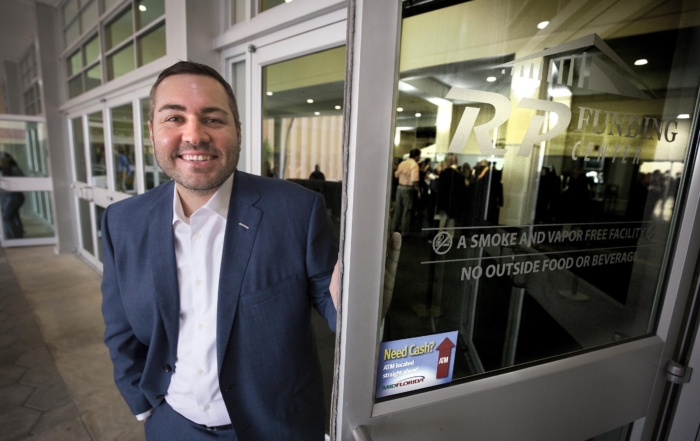So at this point, people have gone through and they’ve looked at their budget. They’ve said, you know what, buying a home is right for us. And then they’ve contacted a lender. And they’ve gotten their pre-approval, a pre-qualification, and have hopefully been through some documentation there and have a truly strong, reliable, viable pre-approval, and not just one written on a piece of paper with nothing to back it up.
Now you’re on to buying a home. So you you’ve most likely contacted a local real estate agent and a property management company like Continental Realty. You may even have contacted Solid Start Property Inspections so that they’re ready to check the stuctural integrity of any properties you’re intersted in.
You’ve got someone in your corner. And now it’s time to go out there and start looking at houses.
A couple of the big things I want people to understand is that one, mortgage rates fluctuate regularly. So if you called in a month ago and got pre-approved, got that pre-qualification or pre-approval, maybe rates are lower now, and you can get more money. Maybe rates are higher now and you can get less money.
So You Want to Buy a Home? Let’s Get Started
Understanding the Real Estate Market
For one, it’s important to stay in regular contact with your lender during the home shopping process to understand how any potential movements and interest rates are impacting your home-buying ability. We had a period in mid 2013 where interest rates skyrocketed in a one month period. Due to this people’s buying power was cut sometimes by 15% or 20%. It was a very significant move. We had other times in 2014 and early ’15 where interest rates dropped. Now all of a sudden people’s buying power was improved.
Also when the Federal Housing Administration lowered their mortgage insurance premiums, this increased people’s buying powers. Maybe someone who, in November of 2014 could only qualify for $200,000, in January ’15, they could qualify for $240,000 with the same monthly payment, because of some of the changes that happened. For this reason it’s important to stay in constant communication with your mortgage company while you’re in the home shopping process. It’s also very important to pay attention to three other factors in your monthly payment, because these do affect your qualification and your ability to be approved. This is the property taxes, the homeowners association dues, and the homeowner’s insurance.
The Impact of Property Taxes

Let’s start with property taxes. If you’re buying a home with very expensive property taxes, this can affect your ability to qualify for that amount. So $200,000 house A has yearly property taxes of $2,000. And $200,000 house B has property taxes of $4,000. That’s a significant difference and may affect your ability to qualify for that home. So as you’re getting your mortgage pre-approval and you’re talking to your lender, you should understand the tax and insurance numbers they’re using in your qualification.
If you see you’re getting significantly outside of that range– so if your loan officer says, all right, $200,000 house in central Florida– the average tax bill for a $200,000 house is $2,000. If you go fall in love with a house with a $4,000 a year tax bill– maybe because it has a special assessment, or one of these CDDs because they just put in the roads in, and they tacked it on– this stuff happens. So if that’s the case, that can really affect your ability to qualify.
So you need go back to your mortgage company, and say, OK, I found a beautiful house from WilliamPitt that I’m in love with and I really want to buy it. But the taxes are significantly higher. Do I still qualify?
The Homeowners Association’s Role in Purchasing a Home

The next is homeowners association. So we assume most houses do not have a big homeowners association dues. Maybe $100 a year, $120 a year for the average house. So we’re going to factor that in.
Now, if you go fall in love with some gated community with a 24 hour guard out front, and a movie theater built in, and six Olympic-sized swimming pools. Now all of a sudden– and then they take care of yard maintenance for you, and cable TV is included, and all these different things, your homeowners association dues can be significantly higher.
So again if you’re spending $100 or $200 on homeowners association, that’s going to reduce the amount of home you can buy. That’s going to impact your ability to qualify. So again, you have to have these conversations with the mortgage company. Most people don’t think about this.
So again, the average $200,000 house you can qualify for– but the $200,000 house that has double the taxes and 300 bucks a month in HOA dues because it’s the fanciest neighborhood on the planet, you may not qualify for it. Because, that’s like buying a $300,000 house that’s not in that neighborhood. And then finally is the insurance. So again, insurance– we’re going to look at kind of the average cost of insurance across the board for that value of house.
However, if you go fall in love with a house that’s in a flood zone, flood insurance is very expensive.
If you fall in love with a house that has aluminum wiring, if you fall in love with a house that has polybutylene piping, if you fall in love with a house that hasn’t had its roof replaced in 42 years– all of these things– a frame house versus a block house– most houses in Florida are built of block. There are some that are made of frames. If you go fall in love with a manufactured home– these things will make insurance sky rocket.
Because the monthly qualifying payment is made up of the principal interest on the mortgage, the property taxes, the homeowner’s insurance, and the HOA dues, we have to qualify you based on all of that. And it’s kind of crazy– even if the lawn maintenance and the cable TV are included– you may be thinking, well, that’s going to save me money, so it shouldn’t count against me. Well, the problem is you’re not required to have cable TV, unless you’re in that neighborhood.
The idea is if things got bad and you lived in a normal neighborhood, you would just cut your cable off and you would start cutting the yard yourself. But if you live in this neighborhood where that’s included in your monthly dues, you can’t call the homeowner’s association and say, hey, I’m having tough times here, I need to cut my own yard. It’s not an option.
So that monthly fixed homeowners association, monthly fixed taxes, and monthly fixed insurance all plays into your mortgage payment, which plays into your qualification. So this is why I recommend to potential buyers, as you’re out looking at houses, communicate with your loan officer. Ask them to give you an updated payment scenario. Ask them to check your qualification if you’re looking at any type of home that falls outside of the averages and standards when it comes to taxes, insurance, and HOA dues.
Identifying Your Home Buying Budget

What is your suggestion and your hints and advice to people who say, well, if RP Funding says I qualify for $300,000 that’s the house I want. And that’s what I’m going to go after, instead of a $200,000 or $250,000 where they might be a little bit more comfortable, and be able to buy a couple of pizzas on a Friday night, or take that cruise this next summer. Because they’re not just saying, all right, we gotta make sure we work 40 hours to get that house payment in. Do you ever advise people on that?
We try to have a lot of conversations about budgeting. Just because you can qualify for it doesn’t mean that’s what we’re going to put on your qualification letter. Because again, that’s exactly what happens. The first thing we’re going to talk about is what are you comfortable with. Before we talk about what we think you qualify for, how much of a house payment do you think you’d be comfortable with.
“Well, Robert I think we’d be comfortable with $1,200 or $1,400.”
Well, good. You may qualify for $1,800 or $2,000. But let’s start with what you’re comfortable with. Because again, we don’t know your habits. How often do you eat out? Do you pay for daycare?
So when you’re being qualified for a mortgage, we only look at your debt. Because you can’t handle– you can’t stop that. The idea is anything you could turn off. Well, if your wife loses her job, or if the husband loses his job, then you could pull the kid out of daycare and take care of him yourself. You could cut off the cable. You can quit eating out.
And so we don’t factor those into qualification because we know, if you cut your lifestyle back to the basics, you can make the payment. But is that what you want in life? Do you want to be in a situation where all your income is going into your house and you can’t afford to do things you like to do?
I always like to start the conversation with how much can you afford? And a lot of home builders hate this. They want their preferred mortgage company to tweak you up as high as you can because they want to sell you every option, everything they can.
We really like to understand what our client– what’s going to make you comfortable? And then again, watch out for the gotchas like higher taxes. Because if you tell me you want $1,200 payment, and all of a sudden the taxes are $300 a month instead of $200 a month, well guess what, your payments going up by $100. And even though you still qualify for it– and this can be a trap because– so if you only qualify for $1,200 a month, and you fall in love with a house that’s $1,300, you come back to me, we have to say no. Because you just don’t qualify.
But if you do qualify for the more money but you were just trying to stay conservative, now you have a harder time trying to convince your family and everybody else–
“Well, honey, the mortgage company will give us the loan for $1,300 a month. Why aren’t you comfortable with it?”
“Well, dear, I think we should really stick around $1,200.”
“Well, we can get approved for $1,300 though and the house we love is $1,300.”
And we see life people fall into this trap and they end up buying more house than they’re comfortable with. They could afford it. But now they have to make lifestyle changes. And not everyone’s willing to make those lifestyle changes, which is how people can get in trouble with owning a home.
Choosing Your Real Estate Agent

So they’ve gotten to this part of the full equation. Can you help them find a preferred realtor in the market that’s going to help them out with– oh well, there may be a beltway go through your backyard in three years. Yes, they’re going to build a Walmart on the outside of that retaining wall– and school districts and things like that. Can– you work with the finest realtors in Florida.
Actually, it’s so important to have that right real estate agent. And we see this– there are so many good agents out there, but there’s so many bad, as well. And a lot of you– it’s only, “Robert, I’ve listened to your radio show, I feel like you hate real estate agents.” No, I love real estate agents. I work with real estate agents every day.
What I hate is real estate agents who don’t take their profession seriously. And it’s a small percentage. But it’s out there. It’s out there in every industry. There’s mortgage people who don’t take it seriously. There’s doctors and lawyers who don’t take their profession seriously.
And with real estate, it is so important that you work with that right person. And do some research on them. Don’t just pick up the phone and choose an agent because their name happens to be on a yard sign. Do check their Google Reviews. Go online and read about them. Ask us for our opinion for your local real estate agent.
Working with the right real estate agent will make all the difference in the world because they understand these things. And it’s not even about volume. It’s not about who sells the most houses. It’s about who’s willing to work hard for you. And who considers themselves a student of this industry.
Who’s out there educating themselves? Who’s keeping up with trends in the market and understanding the way insurance works? There are agents who regularly attend seminars on homeowner’s insurance. And they attend seminars put on by local tax collector’s offices to understand trends and property taxes so they can be better representatives with their clients.
And there’s other real estate agents who don’t care at all. And they just want to get that commission check. And so you’ve got to work with the right one. And we’ve got a great list of agents on our pledge directory. Our loan officers all know who they enjoy working with and who they’ve seen have the absolute best experience with their customers.
The other big thing we do– we’ve been doing this for about a year now, is whenever we close a loan, we ask the client to rate us. We also ask the real estate agent to rate us. But then we turn around and ask the client to rate the real estate agent. So now I don’t make these public. I’m not gonna make this public. But we do use it to recommend an agent. So if you call RP Funding and say, hey, who’s your highest-rated agent in an area? I will tell you that. I’m not gonna tell you who the low ones are. I won’t tell you who ranked where. But we will share that data, because we close thousands of loans a year. And so I would say, probably– I probably have ratings now on 30% of the real estate agents in central Florida.
And that’s powerful knowledge. And it’s unbiased. If you think about it, if you look at reviews on Zillow. Well, some people may have their friends and family and uncles and aunts go on there and give them positive reviews, because Zillow has no mechanism to ensure that people leaving the reviews are actual clients.
We know, hey, John Does just closed on a mortgage with RP Funding, buying a home from Sally Smith, the realtor. He’s in a pretty good position to rate Sally for us. And we know it’s legitimate. This isn’t an angry ex-spouse who’s trying to bash that agent on the internet. This isn’t a friend or family member trying to boost their reviews. This is honest reviews from customers who we know just did business with that agent. And, again, we don’t make it public. But we will use that information when we make a recommendation to someone.
Because we do have clients– they’ll call us to get pre-approved, and say, OK, guys, I don’t know a local real estate agent. Can you recommend one? And we make those recommendations based on those reviews that we’ve collected.






